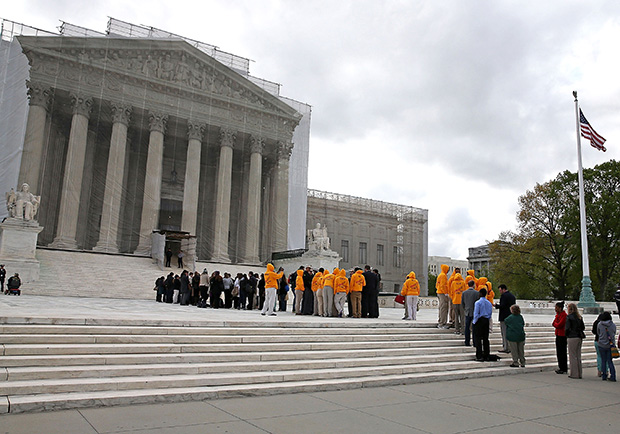The U.S. Agency for International Development's (USAID) policy requiring funded groups to explicitly oppose prostitution is no more—and some faith-based groups say that's good news even though they don't support prostitution.
In a ruling this morning, Supreme Court decided 6-2 that the government can't require grantees to publicly share its views on issues not directly related to the program it is funding.
"The policy requirement goes beyond preventing recipients from using private funds in a way that would undermine the federal program," Chief Justice John Roberts wrote in his summary of the majority decision. "It requires them to pledge allegiance to the government's policy of eradicating prostitution.
In the full decision, Roberts said the anti-prostitution policy was significantly different from other funding rules, like the rule barring groups from using federal funds to advocate abortion. In that case, Roberts said, organizations could still use private funds to promote abortion. The rules change, he said, when the government asks a grantee to take a stand beyond the scope of the government prgram. "By requiring recipients to profess a specific belief, the Policy Requirement goes beyond defining the limits of the federally funded program to defining the recipient."
That's an important victory for evangelical and faith-based groups that promote certain religious beliefs along with their services, says Eric Rassbach, deputy general counsel at the Becket Fund for Religious Liberty.
The ruling strikes down an anti-prostitution policy in the President's Emergency Plan for AIDS Relief (PEPFAR), a Bush-era program to fight HIV/AIDS. PEPFAR previously required grant winners to "explicitly [oppose] prostitution and sex trafficking" overall.
In this particular case, some faith-based groups that would have no problem upholding an anti-prostitution statement opposed the policy on free speech grounds. They feared that allowing the policy to stand would inspire the government to attach "loyalty oaths" to other federal benefits, like tax-exempt status or federal student loans.
Some faith-based groups also have feared that they will be excluded from engaging in social services unless they "toe the line, whether in the area of abortion or contraception," Rassbach says. But today's ruling protects religious groups from that that type of government interference, he said. Although the government still will control what projects it promotes, it cannot require loyalty on unrelated issues.
But others such as Walter Weber, senior litigation counsel the American Center for Law and Justice (ACLJ), previously told CT that government programs do not show unconstitutional bias. Rather, when the government uses these kinds of "good discrimination," Weber said, it is determining if potential partners will be a good fit for its program's aims.
So the ruling now is "good news and bad news," Weber said. "It will depend on who's imposing the conditions. If you have an unfriendly administration, this can be a handy (protection)."
On the other hand, the decision could cut against faith-based groups if there were a favorable administration saying they didn't want money going to pro-abortion organizations, Weber says.
He also points out that this ruling is not aligned with the Court's previous ruling in Christian Legal Society v. Martinez, in which it found that colleges could impose non-discrimination conditions on faith-based groups.
"Those are two inconsistent lines of precedent," Weber said. "If that was okay, why isn't this okay? That's not a good state for the law to be in."
Weber says that Justice Antonin Scalia's minority opinion—that the policy did not overreach PEPFAR's goals—is correct. In his dissent, Scalia wrote that the USAID anti-prostitution rule is "nothing more than a means of selecting suitable agents to implement the government's chosen strategy to eradicate HIV/AIDS. That is perfectly permissible under the Constitution."
The majority agreed that whether or not such discrimination is permissible is "not always self-evident." However, they still maintained that "it is … a basic First Amendment principle that freedom of speech prohibits the government from telling people what they must say."
As a result, justices also stated that government spending programs have to distinguish between "conditions that define the limits of the … the activities Congress wants to subsidize and conditions that seek to … regulate speech outside the contours of the program itself."
Not to do so on a case-by-case basis would reduce the First Amendment to "a simple semantic exercise," the ruling states.
Rassbach says that's exactly what Christians should want to hear.
"You can't take one program … and use that as leverage to force everyone to agree with government," he said. "You don't have to pledge to play."









